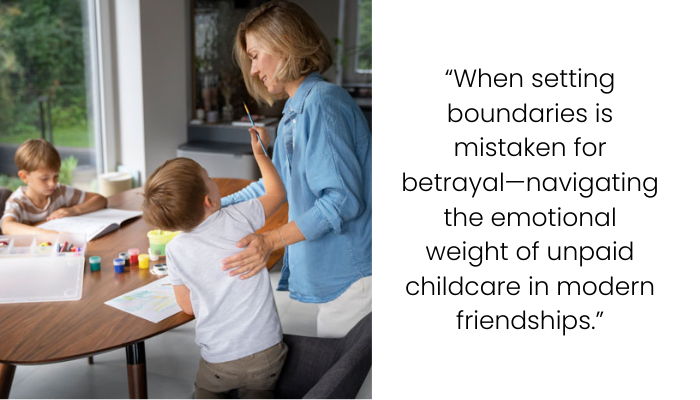Didn’t Lift a Finger for Her Friend, but Flipped Out When She Helped Someone New
When an act of kindness toward one friend spiraled into accusations from another, it became a powerful case study in the complexities of adult friendships and the importance of personal boundaries. A 30-year-old woman generously offered to watch her coworker’s older children—ages 12 and 10—for a special occasion. The experience, although exhausting, was fulfilling and well-received. The gesture, however, didn’t go unnoticed. Another friend, a single mother of two toddlers aged 3 and 1.5, felt betrayed, expressing anger that she had been denied similar help in the past.
What unfolded was a confrontation that explored the nuances between emotional labor, friendship expectations, and the often unspoken rules surrounding unpaid childcare. While one friend saw it as a simple one-off favor, another perceived it as a judgment on her value and circumstances. The clash reveals how differing perceptions of fairness and responsibility can quickly fracture even long-standing relationships—and why communication and boundary-setting are crucial when navigating modern social dynamics.
Friends shouldn’t be expected to constantly provide childcare just because they have free time

The poster shared that her friend was feeling down because she couldn’t carry out her birthday plans, as her mother-in-law wasn’t able to babysit the kids








The Role of Boundaries in Adult Relationships
Healthy boundaries are fundamental to sustainable relationships—especially in friendships that involve caretaking expectations. According to Psychology Today, boundaries help preserve mental health and prevent burnout, particularly in situations where emotional labor is disproportionately expected from one party. The friend who declined repeated babysitting requests had previously communicated discomfort around toddlers and pointed out that her other friend’s children were older, house-trained, and easier to manage—a key distinction in child development stages that affects the mental and physical demands of caregiving.
This distinction is critical. Toddlers, especially those under three, require significantly more attention, supervision, and energy. The Centers for Disease Control and Prevention (CDC) highlight that toddlers are in a phase of rapid emotional and physical growth, often accompanied by tantrums, unpredictability, and high sensory stimulation. Older children, by contrast, generally have greater independence and can regulate themselves in public environments like zoos or parks.
Childcare Is Labor, Even Among Friends
Even when done out of love, unpaid childcare is still labor. A report by the Economic Policy Institute notes that the emotional and physical workload of caring for young children is often undervalued. When one friend consistently asks for unpaid help—without considering the other’s comfort level or lifestyle—it can lead to resentment and emotional imbalance.

In friendships where one party is a single parent, the temptation to rely heavily on a nearby, child-free friend can grow. But without mutual agreement and reciprocity, such arrangements can cross the line from casual support into exploitative expectations. This scenario underlines the importance of establishing and respecting boundaries—even when circumstances seem pressing or emotionally charged.
Miscommunication and the “Fairness Fallacy”
At the heart of this dispute lies the perception of unfairness. The second friend believed that help should be distributed equally among friends, regardless of context. This perception falls into what psychologists call the fairness fallacy—the belief that equitable treatment always means identical treatment. According to Berkeley Greater Good Science Center, people vary widely in their fairness sensitivities, often leading to clashes when their internal standards don’t align.
This fallacy overlooks critical nuances—such as the nature of the request, the relationship with the children involved, and the giver’s willingness. While the woman in the story clearly made a kind gesture for one friend, she also drew the line when the situation became habitual or personally uncomfortable. This balance of generosity and boundary-setting is not only healthy but necessary in preserving long-term relationships.
Folks felt that the poster wasn’t in the wrong at all, and suggested a few things she could tell Kelsey to get her off her back







